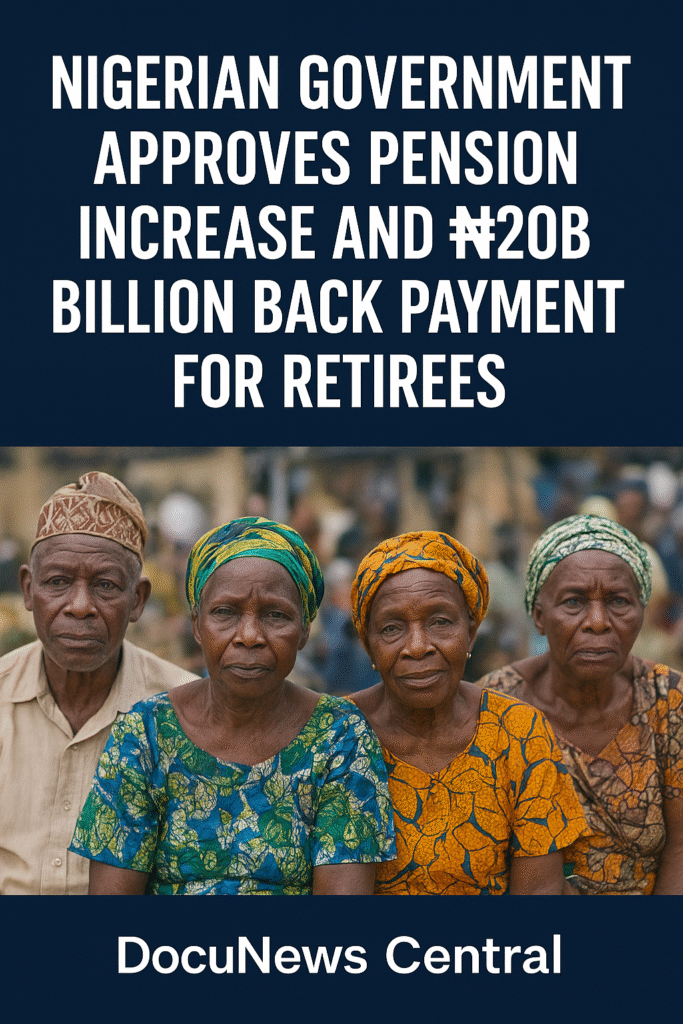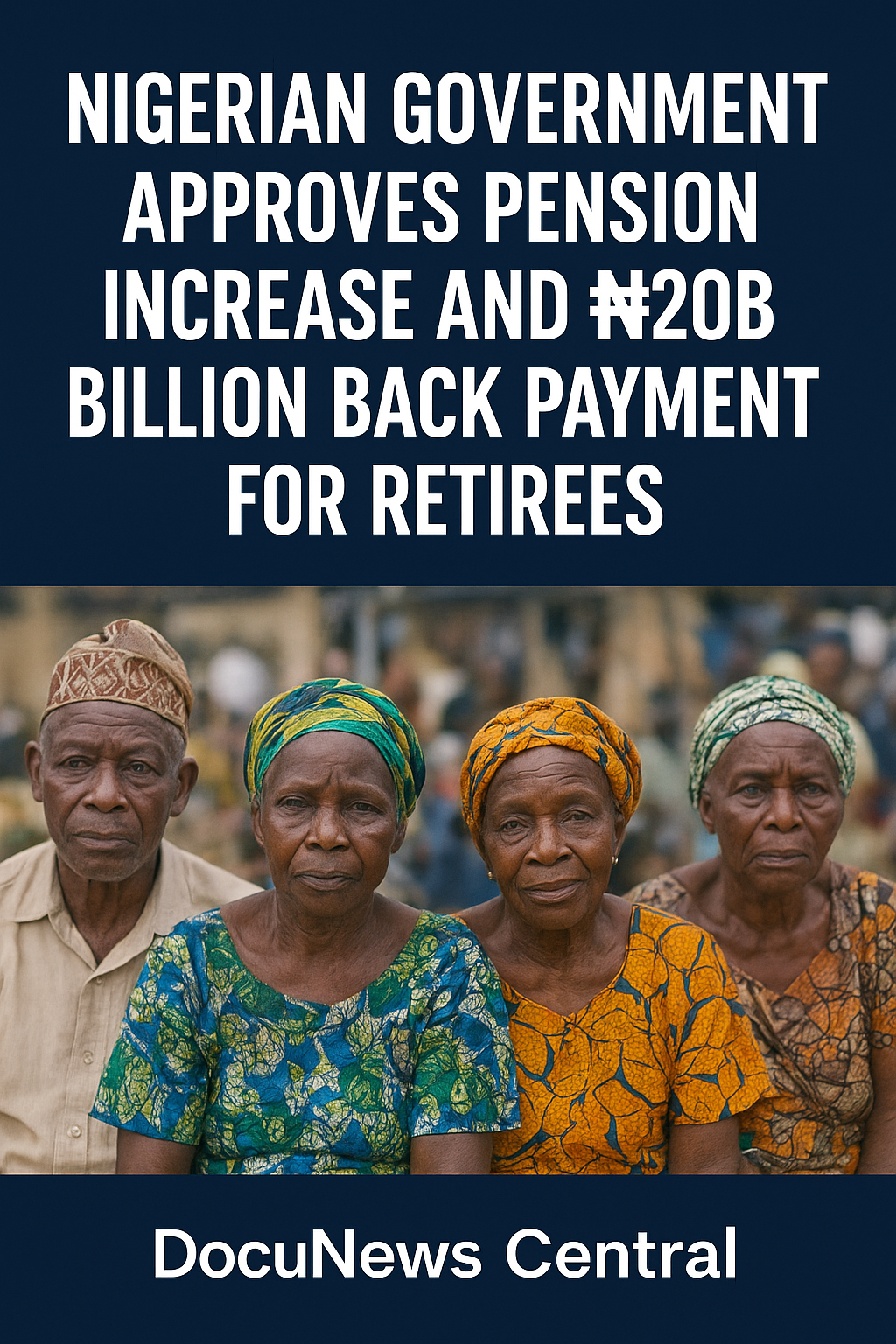
Nigerian Government Approves Pension Increase and ₦20 Billion Back Payment for Retirees
By DocuNews Central Staff • Published: September 30, 2025 • Updated: October 3, 2025

Breaking: The Federal Government of Nigeria has approved a pension increase for retirees under the Defined Benefit Scheme (DBS), and it has released ₦20.188 billion to begin payment of outstanding arrears. The move, confirmed by multiple reliable sources, raises the minimum pension to ₦32,000 and introduces percentage increments for eligible pensioners effective from the September 2025 payroll cycle. read also Abeokuta Murn As Tanker Overturns, Catches fire Many Dead docunewscentra;.com
Pension increases: who benefits and how
The adjustment focuses on DBS retirees — predominantly public servants who retired before the 2004 pension reform. Under the approved changes, the government will implement structured percentage increases, with some pensioners receiving roughly 10.66% increases and others receiving as much as 12.95%, while the minimum monthly pension is raised to ₦32,000. These changes aim to correct the loss of purchasing power that many pensioners experienced due to inflation and rising living costs.
₦20.188 billion released to cover arrears
Importantly, the Federal Government issued an initial tranche of ₦20.188 billion specifically for back payments (arrears) resulting from the adjustment. This amount stems from an emergency allocation approved by the government. Authorities say this tranche represents the start of a wider disbursement plan intended to ensure eligible retirees receive the difference owed to them.
Verified reports and primary sources:
- Legit.ng — FG raises minimum pension to ₦32,000 (Do-follow)
- TVC News — Federal Government begins payment of pension increments
- Nairametrics — Details on the ₦20.188 billion tranche
Why the decision matters
This policy change carries immediate social and economic consequences. First, raising pensions provides direct relief for retirees who depend on fixed incomes. Second, disbursing arrears injects liquidity into local economies because pensioners frequently spend on daily goods, medicine, and transport, thereby helping small traders, service providers, and local markets.
Implementation: PTAD assurances and coverage
The Pension Transitional Arrangement Directorate (PTAD) has indicated that the increments and arrears will be reflected automatically in the payroll of eligible DBS pensioners. PTAD emphasized that retirees do not need to reapply for the increase, and it pledged to minimize bureaucratic delays while processing the arrears.
Fiscal sustainability and potential challenges
Although the increase is welcome, analysts warn about long-term fiscal pressures. Nigeria’s revenue mix remains vulnerable to oil revenue volatility and foreign exchange fluctuations. The government must therefore adopt prudent budgeting and transparent reporting to ensure that enhanced pension obligations remain sustainable without crowding out other essential expenditures such as healthcare and infrastructure.
Administration and transparency concerns
Effective delivery will require efficient administration. Historically, pension disbursements have suffered from delays, record mismatches, and verification issues. To prevent misallocation, stakeholders have urged the government to publish disbursement schedules, track payments publicly where feasible, and empower pensioner groups to monitor distribution.
Pensioners’ reactions and public sentiment
Early responses from retirees and advocacy groups skew positive. Many pensioners welcomed the decision, stating the extra funds will reduce reliance on family members and help cover medical bills. Nevertheless, pensioners emphasized the need for prompt, verifiable payments and transparent accounting of the arrears so that the vulnerable elderly population benefits without further delay.
Wider social impact and future considerations
Beyond immediate relief, the policy raises questions about indexing pensions to inflation and establishing mechanisms for periodic adjustments. Doing so would protect retirees from future purchasing-power erosion. Additionally, conversations have started about whether similar interventions might be required for contributors under the Contributory Pension Scheme (CPS) who face their own post-retirement challenges.
What to watch next
Stakeholders and the public should monitor the following developments closely:
- Public release of a detailed disbursement schedule and payment receipts from PTAD;
- An audit or oversight mechanism to ensure arrears reach the intended beneficiaries;
- Any subsequent tranches or additional emergency allocations to complete arrears payments;
- Policy discussions on indexing pensions or setting a review cadence tied to inflation indicators.
Conclusion
The Federal Government’s approval of pension increases and the release of ₦20.188 billion in arrears marks a meaningful step toward restoring dignity to Nigeria’s retirees. While the move will provide immediate relief, its long-term success depends on transparent implementation and sustainable fiscal management. If the government follows through, this decision could rebuild trust in pension administration and improve conditions for thousands of elderly Nigerians.
For continuous coverage, updates, and official statements, DocuNews Central will follow PTAD releases and report on any new disbursements or policy changes as they occur.
Sources: Legit.ng, TVC News, Nairametrics. DocuNews Central is committed to accurate and timely reporting. If you are a retiree and believe you are eligible but have not received payments, contact PTAD or your pensioners’ association for guidance.
© DocuNews Central — All rights reserved.











One thought on “Nigerian Government Approves Pension Increase”